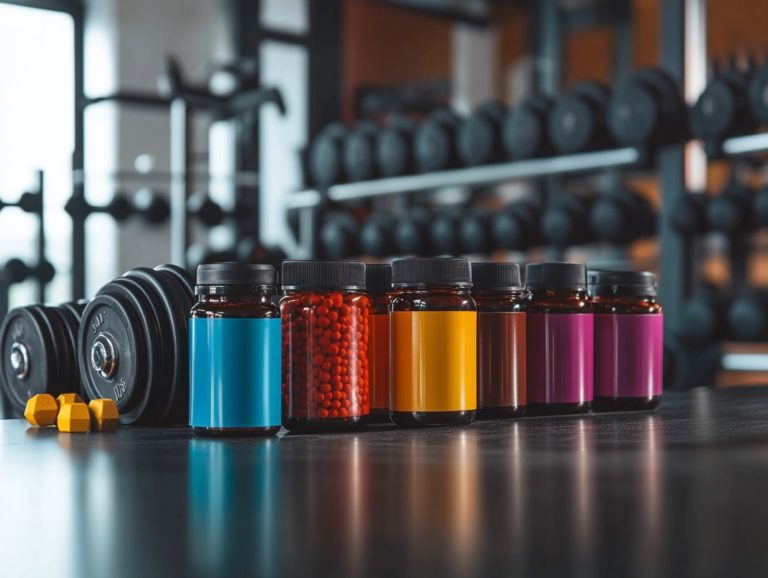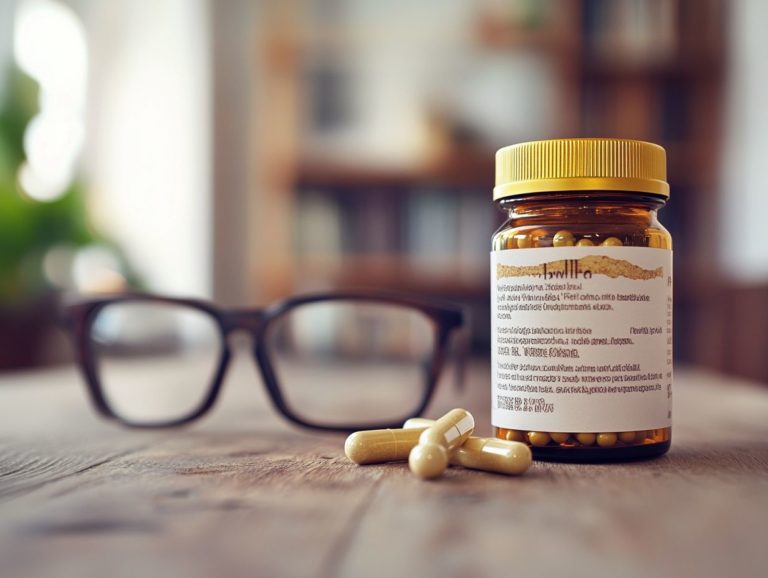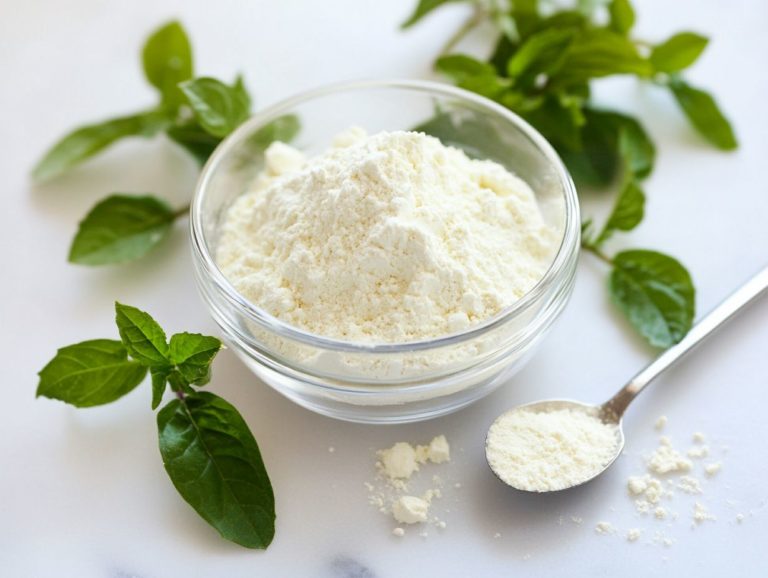5 Reasons to Consider Taking CoQ10
CoQ10, or coenzyme Q10, is a nutrient that plays a vital role in your health. Its benefits aren’t just surface-level; from boosting energy production to acting as a powerful antioxidant, CoQ10 s impact is significant.
This article will present five compelling reasons for you to consider incorporating CoQ10 into your routine. You’ll discover its support for heart health and its potential to enhance your exercise performance.
We will explore the different forms of CoQ10, discuss possible side effects, and examine effective ways to integrate it into your diet. Uncover how this remarkable compound can elevate your well-being!
Contents
- Key Takeaways:
- 1. Helps with Energy Production
- 2. Acts as an Antioxidant
- 3. Supports Heart Health
- 4. Can Significantly Boost Exercise Performance
- 5. Can Help with Migraine Prevention
- What Is CoQ10 and How Does It Work?
- Frequently Asked Questions
- What are the top 5 reasons to consider taking CoQ10?
- Is CoQ10 safe to take?
- What is the recommended dosage for CoQ10?
- Can I get enough CoQ10 from my diet?
- Are there any side effects of taking CoQ10?
Key Takeaways:
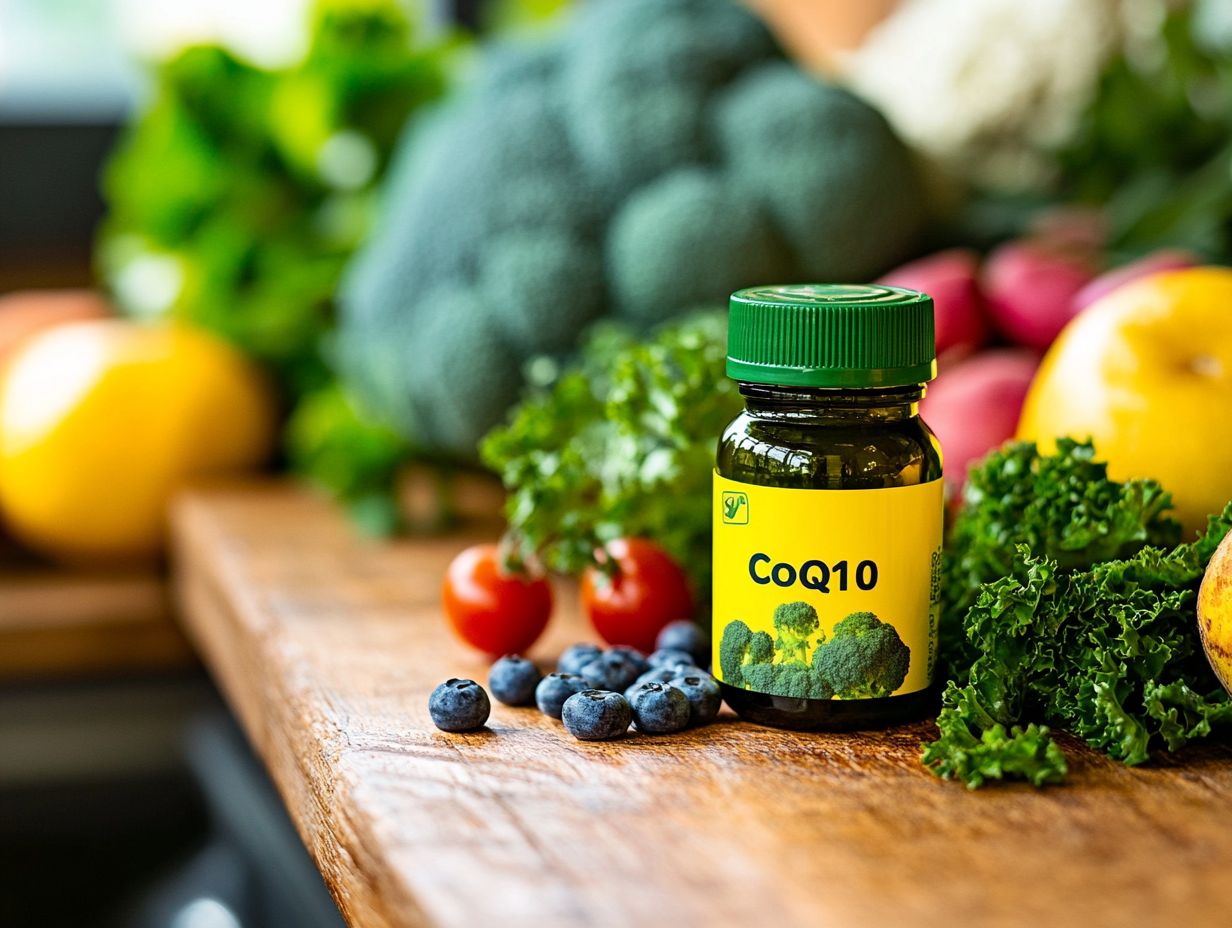
Boost your energy levels by taking CoQ10, which is essential for energy production in the body.
Protect your body from free radical damage with the antioxidant properties of CoQ10.
Promote heart health by taking CoQ10, which helps to maintain a healthy cardiovascular system.
1. Helps with Energy Production
CoQ10 is essential for energy production in your body. It facilitates the conversion of nutrients into a molecule that provides energy to cells within the mitochondria, the powerhouse of your cells.
This process is crucial for maintaining optimal metabolic function and overall vitality. If you’re dealing with muscle pain or fatigue, CoQ10 can enhance your cellular energy levels and support your physical performance.
If you re an athlete, maintaining adequate levels of CoQ10 can boost your endurance and recovery times. This means you can perform at your best while reducing the likelihood of muscle soreness.
It s important to understand the distinction between Ubiquinol and Ubiquinone. Ubiquinol is the active form that your body can use immediately. On the other hand, Ubiquinone needs to be converted before it can contribute to energy production.
This difference underscores the necessity of choosing the right form of CoQ10 for maximum benefit. Both forms are significant in enhancing metabolic efficiency and energy availability at the cellular level.
2. Acts as an Antioxidant
CoQ10 serves as a formidable antioxidant, effectively combatting oxidative stress and safeguarding your cells from damage caused by harmful molecules. This powerful compound is key in thwarting chronic diseases and enhancing your overall health.
By actively neutralizing free radicals, CoQ10 helps diminish the harmful effects these unstable molecules can exert on your cellular structures, DNA, and proteins. This protective function becomes especially significant in chronic illnesses, where heightened levels of inflammation markers such as C-reactive protein and interleukin-6 often come into play.
These markers signal underlying inflammatory processes that can lead to a host of health complications. The antioxidant properties of CoQ10 not only work to reduce oxidative stress but also enhance mitochondrial function, providing a dual advantage for energy production and cellular repair.
Incorporating CoQ10 into your nutrition can thus promote long-term health and bolster your body s resilience against various diseases.
3. Supports Heart Health
CoQ10 is essential for supporting your heart health. It regulates cholesterol levels, improves blood pressure, and enhances energy production in your heart cells.
This makes it a valuable ally in the prevention and management of heart disease and heart failure. This powerhouse nutrient contributes to the production of ATP, the energy currency of your cells, and plays a significant role in maintaining healthy endothelial function.
If you have elevated cholesterol levels, CoQ10 supplementation could be particularly beneficial. It may help lower LDL cholesterol while boosting HDL cholesterol.
Research indicates that CoQ10 may also assist in reducing both systolic and diastolic blood pressure, optimizing heart function. For those already diagnosed with heart disease, clinical trials have shown that CoQ10 could improve overall cardiovascular health, leading to better exercise capacity and an enhanced quality of life.
4. Can Significantly Boost Exercise Performance
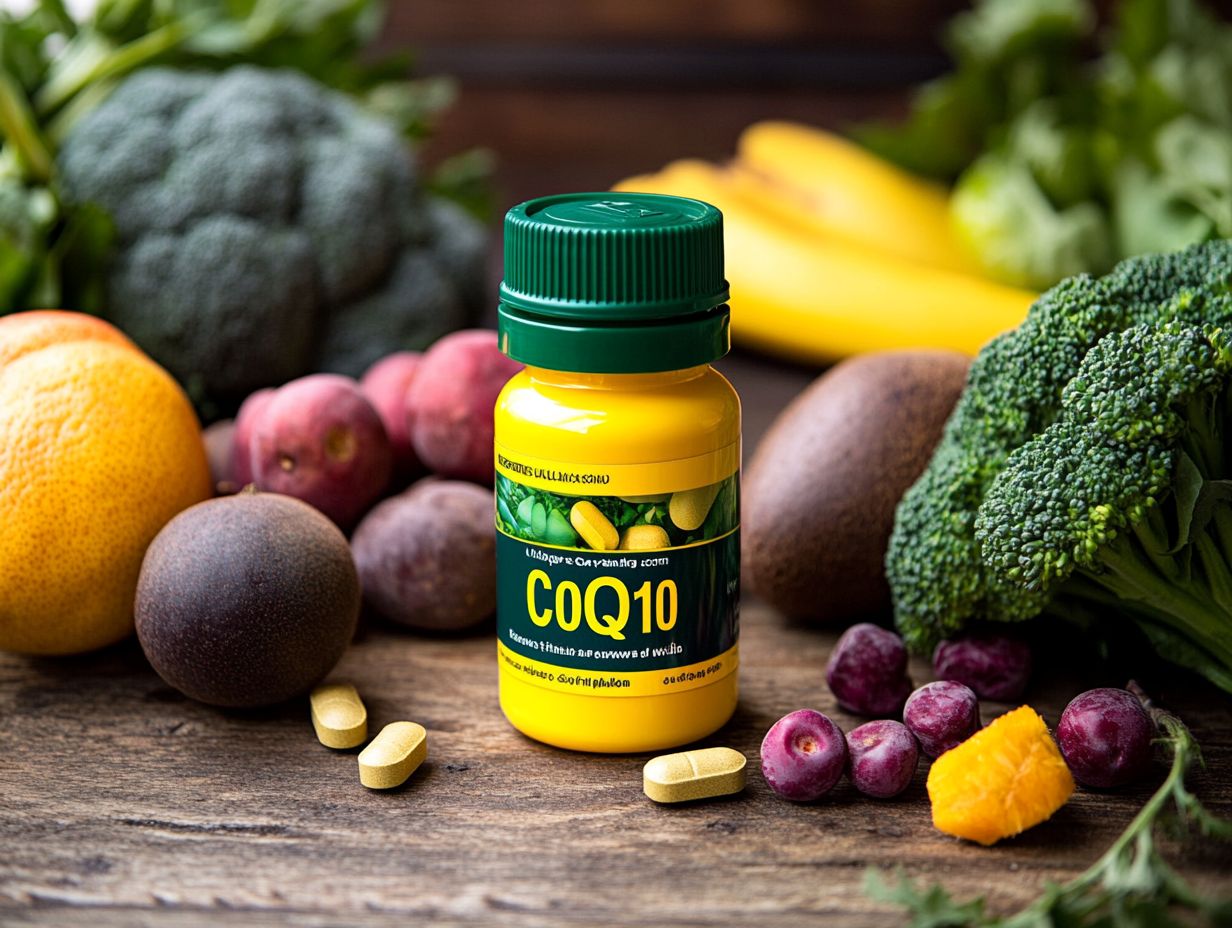
Research suggests that incorporating CoQ10 supplementation into your routine can significantly boost your exercise performance. It does this by optimizing energy production and alleviating muscle symptoms.
This enhancement enables you to maintain higher levels of physical activity and recover more effectively. This is especially relevant for those engaged in high-intensity training.
Studies indicate that CoQ10 significantly improves the part of your cells that produces energy, which is essential during demanding workouts.
Athletes who add CoQ10 often report experiencing reduced muscle pain and fatigue. This leads to improved endurance and overall performance.
Optimal dosing generally falls between 100 to 300 mg daily, tailored to your individual needs and training intensity. Strategic timing of your supplementation, such as taking it before workouts, can further elevate its effectiveness, making it an invaluable ally in your athletic regimen.
5. Can Help with Migraine Prevention
CoQ10 has shown great promise in preventing migraines, likely due to its role in energy production and its antioxidant properties that may help alleviate harmful compounds in the body a known migraine trigger.
Research indicates that CoQ10 enhances ATP production within the mitochondria, essential for maintaining energy levels, particularly in the brain where energy demands are substantial.
Clinical studies have revealed that individuals taking CoQ10 supplements experienced a meaningful decrease in both the frequency and severity of their migraines compared to those in a placebo group.
This means that the compound s ability to combat harmful compounds may also significantly reduce inflammation and stabilize cellular function. Many healthcare professionals now view it as a promising dietary supplement for those seeking relief from migraine symptoms.
What Is CoQ10 and How Does It Work?
CoQ10, or Coenzyme Q10, is an important antioxidant found in your body. It plays a vital role in energy production within the mitochondria. It comes in two primary forms: Ubiquinol and Ubiquinone, both essential for reducing harmful compounds and supporting overall cellular function.
These two forms work in harmony, with Ubiquinol acting as the active antioxidant protecting your cells from damage, while Ubiquinone plays a crucial role in the electron transport chain. This process is fundamental for converting nutrients into adenosine triphosphate (ATP), the energy currency that fuels your cells.
While your body can produce CoQ10, levels may decline with age or certain health conditions. You can boost your intake by incorporating dietary sources like fatty fish, whole grains, and nuts, helping you feel better overall.
What Are the Different Forms of CoQ10?
CoQ10 comes in two primary forms: Ubiquinol, the reduced form, and Ubiquinone, the oxidized form. Each offers unique benefits, especially regarding bioavailability and absorption when consumed as dietary supplements.
When considering supplementation, it’s crucial to note that Ubiquinol is generally better absorbed by your body. This makes it the go-to choice for anyone seeking immediate energy support or addressing specific health concerns.
On the other hand, Ubiquinone is often praised for its stability and longer shelf life, which could make it a more economical option for you.
As you navigate your health journey, understanding your unique needs like age, health conditions, and lifestyle choices will significantly influence which form is ultimately more beneficial for your well-being. By making informed choices, you can effectively enhance cellular energy production and overall health.
What Are the Potential Side Effects of CoQ10?
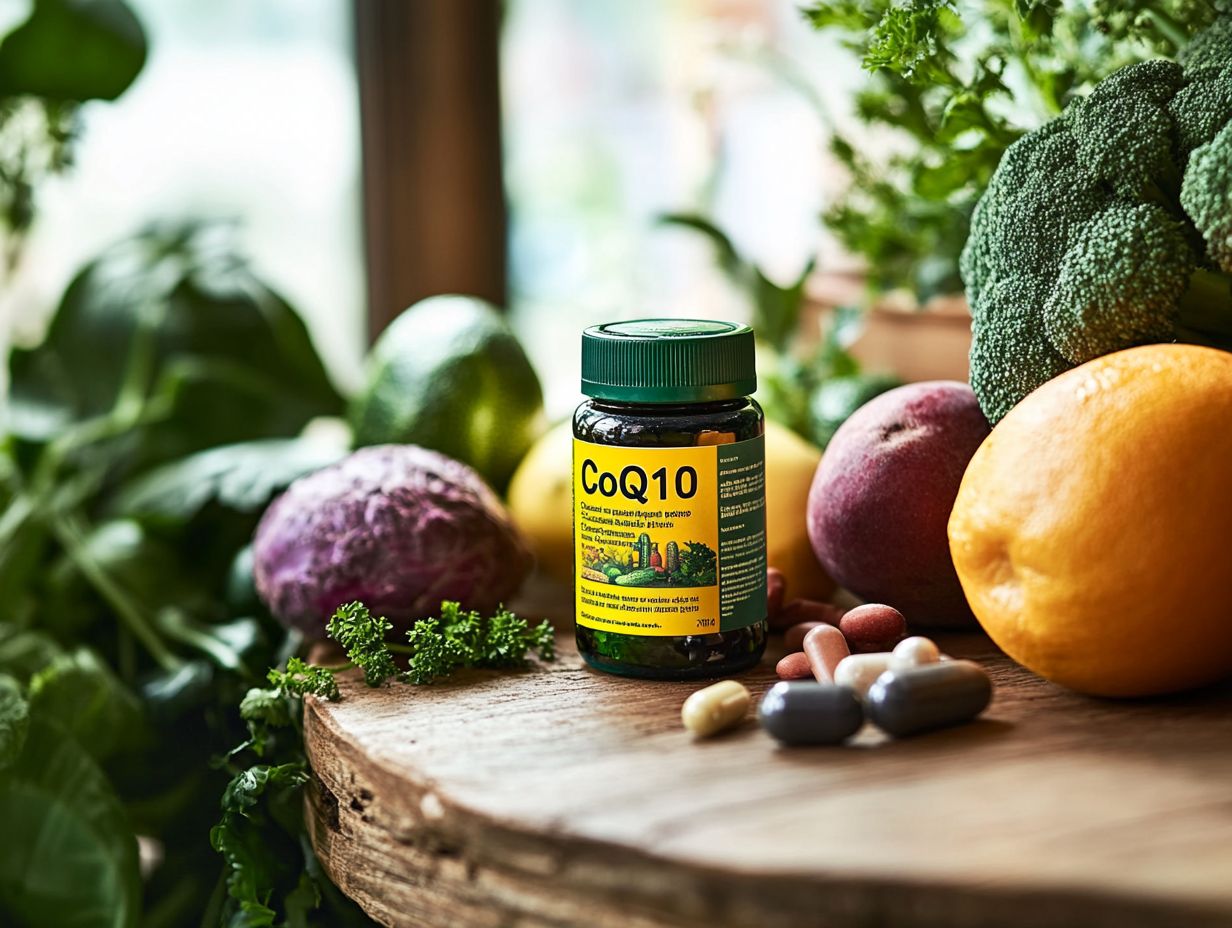
CoQ10 is typically regarded as safe for most people. However, it s wise to remain mindful of potential mild side effects, such as gastrointestinal discomfort and headaches.
You should also be aware of possible interactions with medications, particularly blood thinners. Some individuals may experience rarer side effects like dizziness, skin rashes, or insomnia.
If you re on anticoagulant medications, tread carefully. CoQ10 can influence how these drugs function, potentially altering their effectiveness or increasing the risk of bleeding.
Given these considerations, it’s essential for anyone thinking about CoQ10 supplementation to consult a healthcare professional beforehand. This step ensures proper monitoring, especially for those with underlying health conditions or those taking multiple medications. It helps to prevent any unintended adverse effects.
How Can CoQ10 Benefit Those with Certain Medical Conditions?
CoQ10 supplementation can provide remarkable benefits, especially if you’re navigating specific medical conditions such as heart disease, neurodegenerative diseases like Alzheimer s and Parkinson s, diabetes, or even fertility challenges.
By enhancing energy production and reducing harmful effects caused by free radicals, this supplement can be a game changer for your well-being!
Research has shown that this naturally occurring antioxidant is vital for cellular energy production, particularly within the mitochondria. It plays a key role in generating ATP the energy currency of your cells.
If you re dealing with heart disease, clinical trials indicate that CoQ10 can improve heart function and alleviate symptoms of congestive heart failure.
Studies on neurodegenerative diseases show cognitive benefits and a slower progression in patients taking CoQ10. For those with diabetes, the supplement has been linked to better blood sugar management and improved vascular health.
Even if fertility issues are on your radar, CoQ10 may enhance sperm quality and egg health, making it a versatile ally in your pursuit of better health.
How Can One Incorporate CoQ10 into Their Diet?
Incorporating CoQ10 into your diet can be seamlessly achieved through both dietary sources and supplementation. Foods such as fatty fish, meat, and whole grains provide natural ubiquinone, while supplements offer concentrated doses for those who seek additional support.
To further boost your dietary intake, consider adding nuts, seeds, and leafy green vegetables. These not only enhance your CoQ10 levels but also contribute to your overall heart health.
If you find it challenging to meet your CoQ10 needs through food alone, supplements typically ranging from 100 to 200 mg per day can be quite beneficial. For optimal results, choose products that have undergone third-party testing to ensure they meet stringent quality and potency standards. This way, you can feel confident in your choices.
With various forms available, including soft gels and powders, you can easily find an option that complements your health regimen perfectly.
What Are the Recommended Dosages of CoQ10?
The recommended dosages of CoQ10 can vary based on your unique health goals and conditions. Generally, guidelines suggest a range of 100 to 300 mg per day to reap optimal health benefits.
If you re managing conditions like heart disease or hypertension, higher doses may prove beneficial. Studies indicate that intakes up to 600 mg per day can effectively support cardiovascular health.
Athletes aiming to boost energy levels may benefit from similar or slightly higher doses as well. Don t wait! Consult a healthcare provider to ensure safe supplementation before embarking on any supplementation journey.
They can offer personalized advice tailored to your specific health needs and potential interactions with other medications. This ensures that your approach is both safe and effective.
Frequently Asked Questions
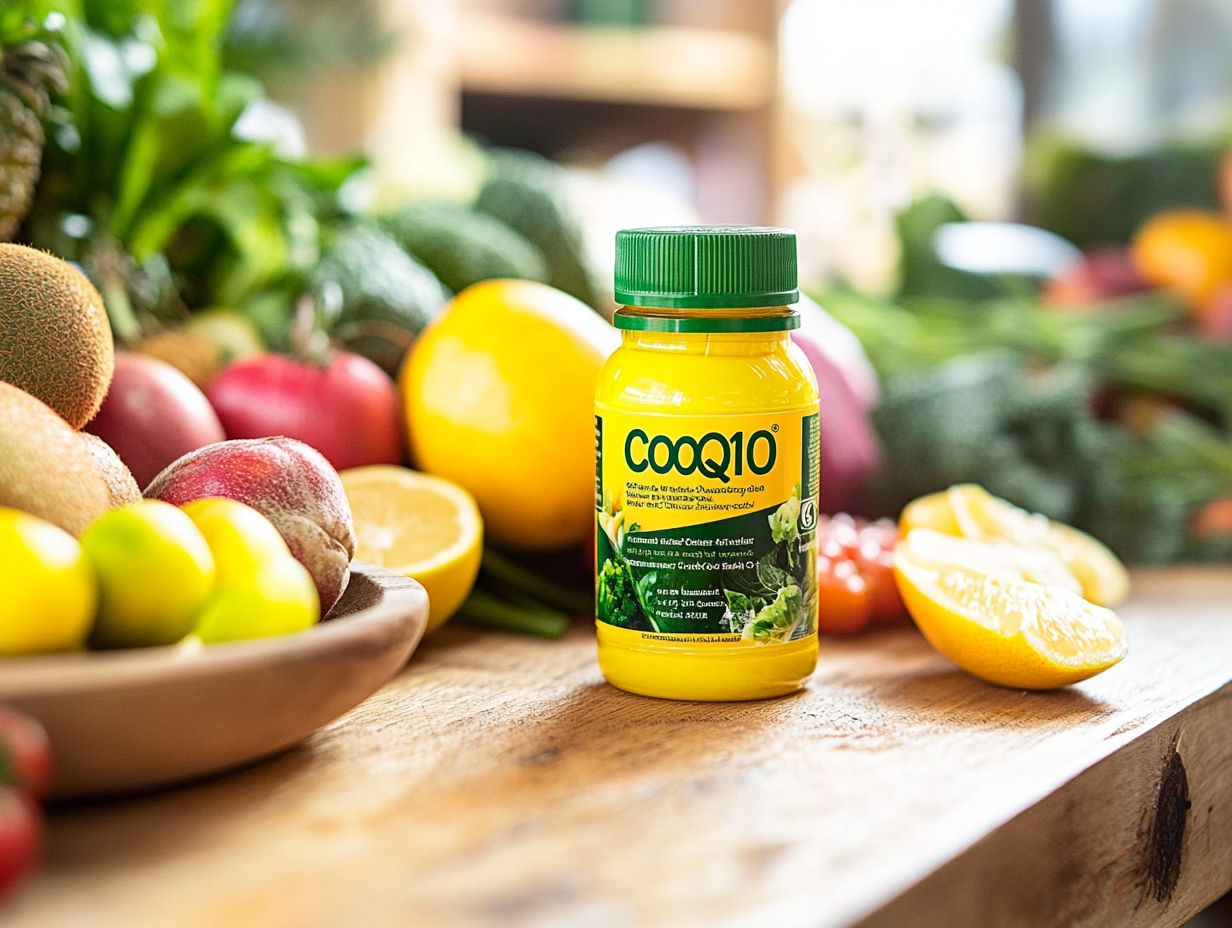
Here are some common questions about CoQ10 to help you understand it better:
What is CoQ10 and why should I consider taking it?
CoQ10 is a naturally occurring enzyme in the body that helps convert food into energy. It also acts as an antioxidant, protecting cells from damage. Taking CoQ10 supplements can benefit your overall health and well-being in various ways.
What are the top 5 reasons to consider taking CoQ10?
1. Boosts energy levels: CoQ10 helps produce ATP, our cells’ main energy source. Supplementing can boost energy, especially in older adults.
2. Keeps your heart healthy: CoQ10 produces energy and protects against oxidative damage to support heart health.
3. Reduces inflammation: CoQ10 may help alleviate pain, swelling, and stiffness from chronic conditions like arthritis.
4. Acts as an antioxidant: It protects cells from free radicals, which can cause various health issues.
5. May improve fertility: CoQ10 can enhance sperm quality and motility in men. It also supports ovulation and egg quality in women.
Is CoQ10 safe to take?
Most people find CoQ10 safe to use. Always consult a healthcare professional before starting any supplement, especially if you have health conditions or take medications.
What is the recommended dosage for CoQ10?
Typical dosages range from 100-300 mg per day, depending on age and health status. Follow product label instructions or consult a healthcare professional for personalized advice.
Can I get enough CoQ10 from my diet?
CoQ10 is found in organ meats, fatty fish, and whole grains, but it might not be enough for therapeutic levels. A supplement can help you achieve the right amount for health benefits.
Are there any side effects of taking CoQ10?
CoQ10 is usually well-tolerated. Some may experience mild gastrointestinal discomfort, headaches, or fatigue. If you notice any negative effects, stop using it and check with a healthcare professional.

